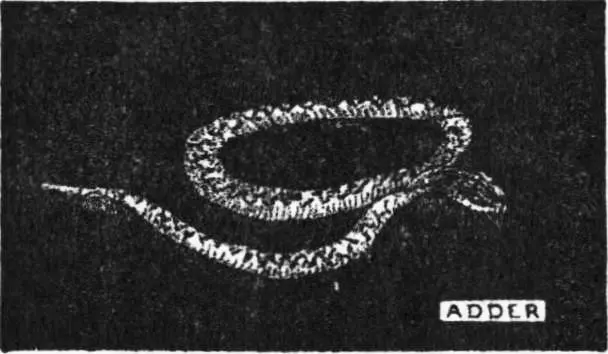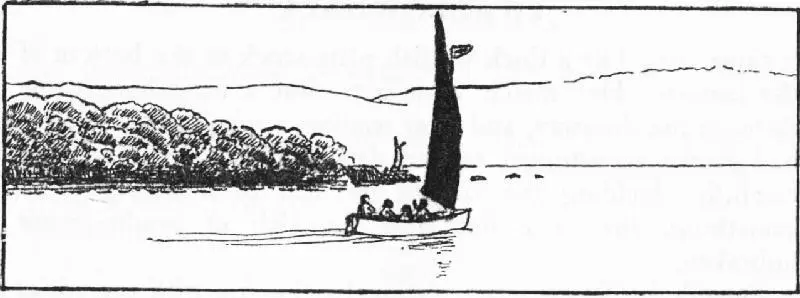Nancy grabbed the telescope. “Yes. There they are. Still together. Quick, quick! They’ll be here in a minute. Let’s go down and see them come over by the waterfall.”
“And put the parrot out of the way,” said Titty. “He’d never understand them.”
They hurried down from the rock and back to the camp, and for the second time that day, the ship’s parrot was banished into Peter Duck’s. They were only just in time.
“Look, look!” said Nancy.
A lean white hound with patches of yellow and black on his shoulders and flanks showed on the skyline at the side of the waterfall, and came leaping down over the rocks.
“Well done! Well done!” shouted Peggy.
“Be quiet! Be quiet!” said Nancy. “Don’t talk to him.”
The hound stopped by the bathing-pool, looked about him, and lapped the cool water.
“He ought not to have done that,” said Nancy.
He had hardly moved forward again before half a dozen more hounds came pouring down the rocks like the white water when the beck is in spate after rain. The leading hound was not more than a dozen yards ahead of them. “He must have lost forty or fifty yards by taking that drink,” said Peggy.
All these hounds took no notice whatever of the camp, but ran straight through it, down Swallowdale, and over the waterfall at the low end. It was only the later comers who stopped to look about them and hardly seemed to be taking the race seriously.
“You’re no good,” said Nancy to them. “Go on.”
“The others are miles ahead,” said Titty. “You’ll never catch them if you don’t hurry.”
These hounds, too, went on after the others and disappeared.
And then, suddenly, from far away below the moor, from the foot of the lake, came a new noise, a noise of yells and rattles and shrill whistles and screams and howls.
“It’s like parrots and monkeys all yelling together,” said Titty.
“Worse,” said Roger.
“That’s the owners of the hounds,” said Nancy. “They must have seen the first one in the distance. Listen! Oh, I wish we could see the finish.”
The noise rose higher and higher. There was a burst of cheering and then the shouts died away into silence.
“It’s over. Now all the owners are patting their hounds and giving them lumps of sugar and telling them how good they are.”
Nancy’s cheerful voice changed suddenly. “The great-aunt won’t be saying how good we are if we’re a minute late for supper. Come on, Peggy. What’s the time, John?”
John looked at his watch, but did not put the time into bells. It was far too serious for that.
“All three meals,” said Peggy.
“We’ve fairly done it this time,” said Nancy. “Come on. We’ll go by the road. It’s quicker, really. And someone may give us a lift. But we’re done, anyhow.”
The Swallows looked at each other. If Captain Nancy Blackett talked of using the road and even hoped for a lift from a native, things must be very bad indeed.
“It’ll be all right when you tell her about the hound-trail,” said John. “She’d understand you had to wait for that.”
“It’s no good talking to the great-aunt about hound-trails,” said Nancy. “Even the shipwreck made no difference to her.”
“And we really did mean to be back for dinner,” said Peggy.
“But you can tell her so,” said Titty.
“She’d only look at mother,” said Nancy.
“We’ll go with them as far as the road,” said Susan, jumping up.
“Yes,” said John. “Come along, Roger.”
“Never mind,” called Peggy over her shoulder. “Don’t bother.”
“We want some milk at the farm,” said Susan.
“And I want to give a rub to the mast,” said John.
Really, they wanted to be with their allies as long as they could. They would have liked to go with them all the way to Beckfoot to face the great-aunt herself.
“Aren’t you coming, Titty?” said John.
“Someone’s got to look after the fire unless we put it out,” said Susan, picking up the milk-can.
“I’ll stop,” said Titty. “I want to. Good night, Captain Nancy. Good night, Peggy.”
Nancy and Peggy were already hurrying down Swallowdale to go through the woods to the road that would take them along the shore of the lake back to Beckfoot and to all kinds of trouble. They went off at such a pace that the others had hard work to keep up with them.
As soon as they were all out of Swallowdale, Titty went straight to Peter Duck’s cave. She found it in darkness. The candle was out. She got a box of matches from her tent and went into the cave again. Yes, she had been quite right. The lantern had got very hot and had melted the candle too fast, and all round it on the ledge of rock that made a shelf was a mass of thick white candle-grease.
“It isn’t wax,” she said to herself, “but it’s good enough for the great-aunt. Anyway, it’ll have to do.”

Chapter XVIII.
Candle-Grease
Table of Contents

It was not that Able-seaman Titty knew very much of the mother of the Amazons. She had seen her only twice, once last year after the great storm on Wild Cat Island, when she had been full of chatter and jollity, and once this year sitting sadly in the carriage side by side with the great-aunt, while Nancy and Peggy sat on the other seat facing them, and looking not at all like pirates. It was not really of Mrs. Blackett she was thinking. She was thinking of her own mother. When Nancy told of how the great-aunt had made Mrs. Blackett cry, Titty thought of what she would feel if someone were to do that to mother, and in a moment she was feeling as if the great-aunt had made mother cry, so that there was nothing Titty would not have been ready to do to the great-aunt if only it would stop her. She did not know if the wax image would work, but it was worth trying, even with candle-grease, because there was nothing else that she could do.
She picked up the little lantern from the shelf of rock and the candle-grease that had oozed out and hardened all round it came away like a thick whitish plate stuck to the bottom of the lantern. Her match went out. But a little light came through the doorway, and after waiting a minute till her eyes had grown accustomed to the dark, she stooped low, and carefully shielding the lantern for fear of knocking it on something, she came out with the slab of candle-grease unbroken.
Outside in Swallowdale, sitting by the fire with the sticks crackling cheerfully, the clean blue smoke climbing up into the evening sky, and the parrot out of his cage and preening his breast feathers, she very nearly gave the thing up. Looking at the smooth, hard, oily slab of candle-grease which she had now broken off the lantern, she began to doubt if she could do it. What was the great-aunt like? She remembered the stiff, upright figure in the carriage, but could not see her face, try as she would. Then she remembered the native images she had seen in a museum. After all, they weren’t very much like anything.
“It’s the name that matters,” she said to herself, “and the magic.”
The name would be easy. She would simply call the thing “great-aunt.” The magic would be more difficult. Just making a candle-grease doll and calling it “great-aunt” would hardly be enough. There would have to be a spell. Why, of course she knew the way to do it. She remembered the African and Jamaican stories told by her mother in the evenings, and how when the king’s wife died in the heat of the weather and the king he was real vexed, he sent for the Obeah woman who was the witch and had wrinkles deep as ditches on her brown face and told her to cast a spell so that nobody should use his queen’s name again, because his queen she was so beautiful. “And de Obeah woman, dat was de witch, she walk roun’ de room an’ roun’ de room an’ roun’ de room, castin’ one spell dat anybody who use dat name again dey dwop down dead dat minute. . . .”
Читать дальше














